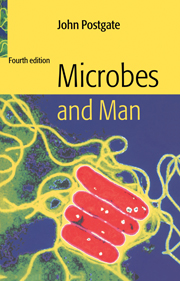Book contents
- Frontmatter
- Contents
- Illustrations
- Preface
- 1 Man and microbes
- 2 Microbiology
- 3 Microbes in society
- 4 Interlude: how to handle microbes
- 5 Microbes in nutrition
- 6 Microbes in production
- 7 Deterioration, decay and pollution
- 8 Disposal and cleaning-up
- 9 Second interlude: microbiologists and man
- 10 Microbes in evolution
- 11 Microbes in the future
- Further reading
- Glossary
- Index
2 - Microbiology
Published online by Cambridge University Press: 18 December 2009
- Frontmatter
- Contents
- Illustrations
- Preface
- 1 Man and microbes
- 2 Microbiology
- 3 Microbes in society
- 4 Interlude: how to handle microbes
- 5 Microbes in nutrition
- 6 Microbes in production
- 7 Deterioration, decay and pollution
- 8 Disposal and cleaning-up
- 9 Second interlude: microbiologists and man
- 10 Microbes in evolution
- 11 Microbes in the future
- Further reading
- Glossary
- Index
Summary
In the early 1950s I was involved in the foundation of the National Collection of Industrial Bacteria (NCIB), a sort of bank established in Britain from which strains of industrially significant microbes could be obtained. Today it has grown into the National Collection of Industrial and Marine Bacteria (NCIMB) in Aberdeen and it is part of a valuable network of collections of microbes. The NCIMB has an important function: not only does it act as a reserve of organisms used in industry and non-medical research, but it also keeps typical bacteria involved in spoilage and deterioration, so that technologists can obtain reference strains to compare with those which may be causing trouble. In the early days of the NCIB's existence, parties of visitors used to come to see it. On one occasion a small party of civic dignitaries and their wives visiting the locality from France came round. I never clearly understood why, as it seemed a rather soggy sort of entertainment for the local municipality to arrange. However, I well recall the alarm shown by the wives when, not having at first understood the word bactéries, they suddenly realized they were amid a collection of germes. As one woman they pulled out handkerchiefs, covered their noses and left as soon as they politely could.
Laymen always associate bacteria, microbes and germs with disease. Microbes seem to have a faintly alarming or disgusting aura, and the fact that by far the majority are nugatory or even beneficial is rarely understood. Yet it is so.
- Type
- Chapter
- Information
- Microbes and Man , pp. 17 - 53Publisher: Cambridge University PressPrint publication year: 2000



